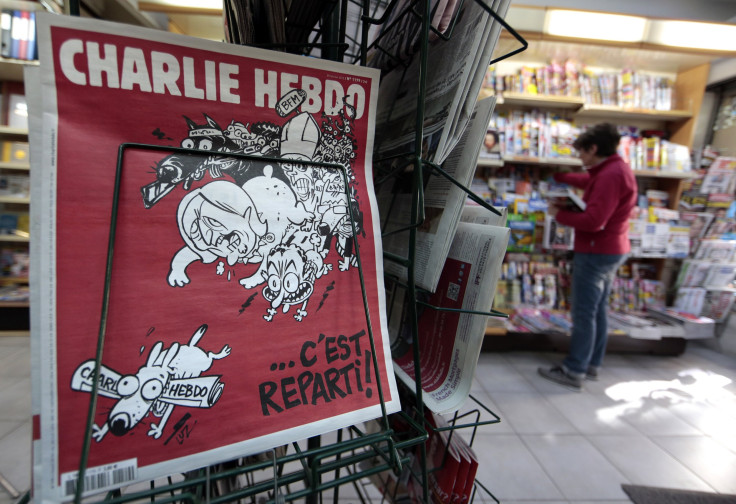Russian Plane Crash Charlie Hebdo Cartoon Is 'Blasphemy,' Russia Says Over Magazine's Latest Edition

While world leaders offered opposing theories on what brought down Russian Metrojet Flight 9268 over Egypt, killing all 224 aboard, Russian media Friday focused on cartoons of the incident published by the French satirical magazine Charlie Hebdo, Russian media reported. Russian President Vladimir Putin’s press secretary called the cartoons “blasphemy.”
“This has nothing to do with democracy, self-expression or whatever," Press Secretary Dmitry Peskov said. "It is pure blasphemy."
The cartoons were published in the latest edition of Charlie Hebdo and quickly drew angry reactions from Russians on social media, with the head of the Rodina Party calling the cartoons “Russophobic art.” One of the cartoons shows a member of the Islamic State group, also known as ISIS, covering his head while debris from the Metrojet plane falls around him with the caption reading, “Russia’s air force intensifies its bombing.”
Allegedly these are new #CharlieHebdo cartoons mocking a tragedy as a result of which 224 people died. pic.twitter.com/VauuozEDrt
— Yury Barmin (@yurybarmin) November 6, 2015The editor of Charlie Hebdo, Gérard Briard, criticized the Kremlin’s reaction to the cartoons.
“We are a secular, democratic and atheist newspaper. The term blasphemy has no meaning for us,” he said speaking with the Russian branch of French radio station RFI, according to the Moscow Times. “The Kremlin is using this to detract attention from other problems.”
Russia began airstrikes over Syria Sept. 30 with the U.S. and other Western states saying the Kremlin was working to prop up the regime of Syrian President Bashar Assad instead of targeting ISIS.
Investigators were still working to establish the cause of the Saturday downing of the Metrojet flight from Egypt to St. Petersburg. American and British authorities have said a terrorist attack was a possible cause of the downing of the aircraft while Russian and Egyptian authorities have shied away from this explanation.
Charlie Hebdo has long published controversial cartoons including ones of the prophet Muhammad as well as other airplane disasters including the search for missing Malaysia Airlines Flight MH370. The magazine was the target of a terrorist attack in January in which 12 people died, making it one of the worst domestic terrorist acts in France.
© Copyright IBTimes 2024. All rights reserved.












